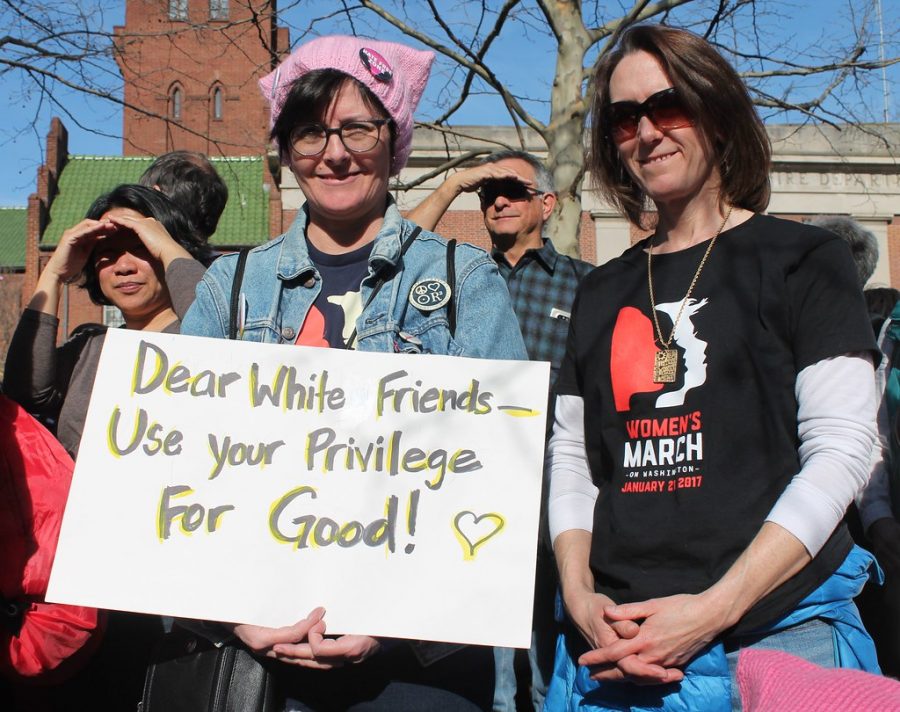Rowland: White privilege needs to be addressed
White privilege needs to be addressed, and it needs to be solved.
February 27, 2020
As Black History Month draws to an end, I am once again reminded of my own privilege. While this statement may seem odd or bristling, it’s true. I don’t have to fight for recognition or equality regarding my race; it is handed to me on a sterling silver platter. I don’t experience injustice or maltreatment based on my race, while others do. That’s what privilege is: enjoying favor.
White privilege doesn’t mean that just because you’re white your life isn’t hard; it means that your skin color isn’t one of the things making your life more difficult.
White privilege stems from institutionalized racism and white supremacy and therefore is a generally subliminal occurrence. Identifying white privilege and being cognizant of the the favor that non-people of color receive can lead to a society of equality, especially when some exploit their own white privilege to their advantage.
Many people do not consciously participate in bigotry or racism, but the structure of our society often influences us to have unconscious biases or prejudices that inadvertently affect our decisions. That is why unlearning ingrained perspectives regarding race is directly tied to acknowledging white privilege. Once you realize the adversity and difficulty that others face, you are often able to recognize the disparagement between your situation and theirs.
White privilege is not a myth or a political stunt. The facts supporting the existence and perpetuation of white privilege are concrete and verifiable. For instance, young black males are 21 times as likely as young white males to be killed by police, and even this statistic probably only reports a fraction of the real problem. Many police departments don’t record fatal shooting incidents. In fact, “Florida departments haven’t filed reports since 1997 and New York City last reported in 2007.”
Our justice system is probably the most telling tale of racial profiling. “Black men who commit the same crimes as white men receive federal prison sentences that are, on average, nearly 20 percent longer.” Racial profiling has been shown to increase in the courtroom after United States v. Booker, a case allowing judges more freedom and personal discernment in their sentencing decisions.
The prison further illustrates this point. “Minorities are less than 28 percent of the U.S. population, but they are nearly 60 percent of the prison population. African Americans are less than 13 percent of the U.S. population, but they are 38 percent of the American prison population.” The prison system has often been compared to the American slave system, as they are both privately owned industrial complexes, many prisoners are leased to private companies for compulsory labor (if they refuse to complete their assigned labor they may be forced into solitary confinement or have visiting privileges denied), and the workers exist in inhumane conditions. In fact, there are currently more black U.S. citizens incarcerated than there were slaves in 1850.
But white privilege extends beyond the government. A clear example of prejudice is found within the American education system. A study by Georgetown University found that “The higher education system is more and more complicit as a passive agent in the systematic reproduction of white racial privilege across generations. Even among equally qualified white, African-American and Hispanic students, these pathways are not only separate, but they bring unequal results.”
This disparity lends itself to employment as well. According to a study by the Young Invincibles, a black college-educated student has the same chances of obtaining a job as white high school dropout. In other words, a black person needs to complete two more degrees to reach an even playing field with his or her white counterpart.
Clearly, these statistics are not composed of outliers and coincidences. There is a clear trend of bias against minorities, with black people receiving the hardest blow.
Privilege often goes unnoticed by those that benefit from it, which can lead to difficulty accepting their own reality that they do indeed benefit. Some white people may feel as if they are somehow consciously engaging in racism by acknowledging that they hold privilege, but that is simply untrue. I get it. The topic is uncomfortable; it isn’t exactly warm and fuzzy to discuss police brutality and racial profiling. But that’s the whole point. Discussing the issue and uncovering the root of the problem is the only way to solve the issue.
Ignorance is never bliss, for ignorance can harm. White privilege needs to be addressed, and it needs to be solved.










